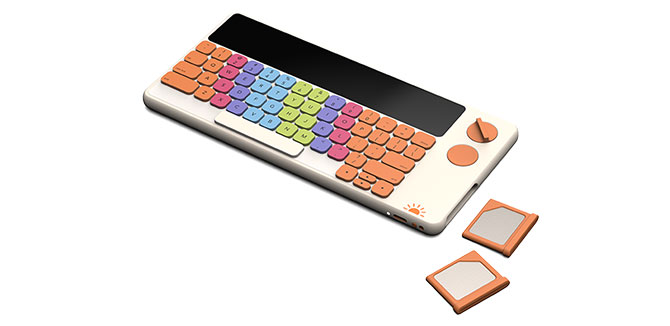Gamifying Learning to Type

At first glance, Roxy Capron (mpd² ‘24) and Patrycja Delcourt’s (mpd² ‘24) capstone project seems a bit contradictory.
Their goal is to create a product that teaches typing skills to children without introducing more screen time. And no, they aren’t talking about returning to typewriters.
Capron and Delcourt are developing MiniMax, a collection of toys to help children build foundational digital literacy. Their first product, the Type & Play, will focus on keyboard skills.
Their capstone journey is a strong example of what Northwestern Engineering's Master of Product Design and Development Management (mpd²) program is all about.
“There is a huge amount of learning happening in a very enriching environment where we have the opportunity to try on many different hats and different ideas,” Capron said. “The program gives us a lot of confidence to try different avenues for our project because there is a team of supportive faculty members helping us succeed.”
Capron and Delcourt's capstone project changed form and function several times throughout the year. That isn’t uncommon for mpd² students as they learn how to be successful product-development leaders.
The mpd² program is a blend of product design, development, and business, and students focus on building empathy and understanding users through primary research. Capron's and Delcourt's iterations and narrowing of scope resulted from contextual interviews with both children and adults.
“During our interviews with teachers, they highlighted the discontinuation of formal typing classes and the excessive dependence on smart devices equipped with touch screens and assistive writing features like voice-to-text and AI text generation,” Capron said. “We firmly believe that typing remains a foundational skill for success in today's digital world.”
Statistics support that belief. A report by the Bureau of Labor Statistics on the occupational requirements in the United States showed that traditional keyboarding skills are required for more than 60 percent of workers.
A Kaiser Family Foundation report, meanwhile, showed that children aged 8 to 18 spend an average of more than seven hours a day in front of screens, with teens averaging nine hours per day.
“Parents want to prepare their kids for the real world, which increasingly requires computer skills, while also wanting to limit time using technology,” Capron said. “This presents an exciting opportunity to reconcile conflicting goals through innovation.”
And therein lies the beauty of the mpd² capstone, the duo said. It challenges students to put their mpd² learning into practice while empowering them to think big and accomplish meaningful goals.
"For us, typing is just the beginning," Delcourt said. "Digital literacy extends beyond basic computer skills. It encompasses the ability to search for and create content, problem-solve, communicate effectively online, collaborate, and practice positive behaviors. Young learners should also learn to recognize risks and stay safe in the digital world."
Their hope is to gamify education, teaching typing skills without kids realizing they are learning because the experience is so enjoyable.
"We are confident that increased keyboard usage can enhance typing abilities, whether through structured lessons or incidental learning," Capron said. "Introducing typing practice within gameplay will encourage children to participate in more frequent and extended typing sessions. Motivated by friendly competition, kids will make gains in speed and accuracy — and form some happy memories along the way."
